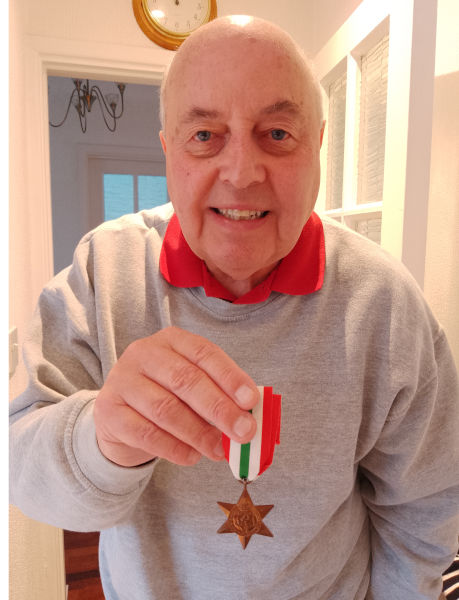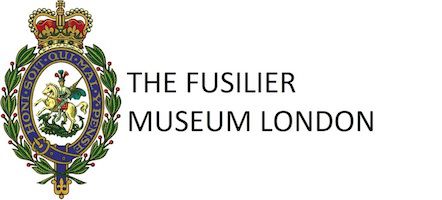THE
MISSING ITALY STAR: REUNITING THE MEDALS OF SGT HENRY EAGLES
By Paul Treacy and Rob Gill
 It’s
funny what boredom will do when you are sitting at home under Covid lockdown.
Rob Gill decided to sort out the loft. Upon discovering a long forgotten
childhood memento belonging to a neighbour, Rob submitted an inquiry to the Fusilier
Museum London for information on a Royal Fusilier he had known while growing up
in Cardiff. The Museum produced the following report:
It’s
funny what boredom will do when you are sitting at home under Covid lockdown.
Rob Gill decided to sort out the loft. Upon discovering a long forgotten
childhood memento belonging to a neighbour, Rob submitted an inquiry to the Fusilier
Museum London for information on a Royal Fusilier he had known while growing up
in Cardiff. The Museum produced the following report:Henry Richard Eagles attested to join the Royal Fusiliers (City of London) Regiment on the 28th September 1927. At the time of attestation, he was 14 years old and gave his occupation as a Scholar, having been born in Hackney on the 19th April 1913. His initial service was for nine years three months, and upon completion he left the Regiment in 1936. The registration book notes “Extracted to the National Service Reserve Index W”, meaning he was available for recall to the army if needed. We assume that he was recalled in August 1939.
As WW2 service records are currently only available to relatives of the deceased, we could not discover his original Battalion. This makes his early war service unavailable to us. However, Eagles certainly saw service in Italy with the 1st Battalion as on the 26th October 1944 he was Gazetted to receive the Military Medal for his actions at the River Gari on the 13th May. The citation reads:
During the assault crossing of the R. Gari and the subsequent two day occupation (12/13 May '44) by the Bn of an exposed position on the river bank under direct vision from enemy posts 300 yds away he [Eagles] continued to move about under heavy Mortar, MG and shellfire, collecting, treating and evacuating casualties until finally himself wounded by an enemy sniper and ordered to return. His disregard of personal danger and untiring energy were of the utmost value both as an encouragement to others and as a direct means of saving many lives and were characteristic of the great personal courage he has shown on many previous occasions.
 Eagles was also Mentioned in Despatches, gazetted on the 11th January 1945, although we cannot currently find the citation for this award. He was wounded again near Monte Fiosola east of Florence. For his service Sgt. Eagles
received the following medals; the Military Medal,1939-45 Star, Defence Medal,
War Medal with MiD Oak Leaf and the Army Long Service Medal. These were
presented to the museum by his widow in 1966. But where was the Italy Star that he should also have
received?
Eagles was also Mentioned in Despatches, gazetted on the 11th January 1945, although we cannot currently find the citation for this award. He was wounded again near Monte Fiosola east of Florence. For his service Sgt. Eagles
received the following medals; the Military Medal,1939-45 Star, Defence Medal,
War Medal with MiD Oak Leaf and the Army Long Service Medal. These were
presented to the museum by his widow in 1966. But where was the Italy Star that he should also have
received?Rob Gill picks up now with the tale of Eagles’ (or Harry, as he was known to Rob) post-war life in Cardiff:
Harry Eagles was a next-door neighbour of mine when I was a young boy in the 1950’s/60’s. I had long forgotten about him until a recent loft clearance revealed memorabilia which rekindled my distant memories.
I remember that he had been in the Army during the war and after being demobbed in 1945 he married Constance, a Cardiff girl. He moved from London to South Wales and became a police constable with the War Office (now MoD Police). I remember that he used to cycle from home to the large Royal Ordnance Factory in Llanishen in the north of Cardiff where he was part of the security force which guarded the gates, perimeter fences and the installations.
He was a well-built, quiet, private man who was keen gardener and in summertime he would strip to his waist whilst tending his vegetables and flowers. I remember seeing two large wounds in his upper back which my father told me were bullet wounds which Harry had sustained during his time in the Army in the Second World War. Harry never spoke about the war to me or anyone else.
 Whilst
playing around on a nearby muddy building site as an eight-year-old boy in
1958, I fell into a foundation trench and became stuck in mud up to my waist.
Unable to get out, I was gradually sinking deeper into the morass. One of my friends raced home to sound the
alarm and Harry came running to my aid and with some planks and a rope. He
pulled me out, less my wellington boots which were stuck fast and were left
behind for posterity! I remember being very frightened at the time and a little
later Harry, being sympathetic to my trauma, gave me a medal for being a ‘brave
boy’. Later he also gave me a small mahogany box with an inset military badge
and what I assumed at the time to be a large white feather all of which have
lain forgotten in a storage box in the lofts of my various houses for the past
60 years.
Whilst
playing around on a nearby muddy building site as an eight-year-old boy in
1958, I fell into a foundation trench and became stuck in mud up to my waist.
Unable to get out, I was gradually sinking deeper into the morass. One of my friends raced home to sound the
alarm and Harry came running to my aid and with some planks and a rope. He
pulled me out, less my wellington boots which were stuck fast and were left
behind for posterity! I remember being very frightened at the time and a little
later Harry, being sympathetic to my trauma, gave me a medal for being a ‘brave
boy’. Later he also gave me a small mahogany box with an inset military badge
and what I assumed at the time to be a large white feather all of which have
lain forgotten in a storage box in the lofts of my various houses for the past
60 years.The awakening of this memory a few months ago prompted me to try and find out what happened to Harry. I discovered that he died in 1968 at the age of only 55. However, the wonders of the internet unexpectedly revealed an entry in the London Gazette which recorded that Harry was awarded the Military Medal in 1944 whilst serving with the Royal Fusiliers (City of London Regiment) in Italy.
 I
contacted The Fusilier Museum in HM Tower of London and Paul Treacy, a
volunteer researcher, confirmed that Harry had indeed joined the regiment in
1927 at the age of 14. Harry served throughout
the war, being wounded in Italy on the 13th and 27th August 1944 by which time
he was a Sergeant.
I
contacted The Fusilier Museum in HM Tower of London and Paul Treacy, a
volunteer researcher, confirmed that Harry had indeed joined the regiment in
1927 at the age of 14. Harry served throughout
the war, being wounded in Italy on the 13th and 27th August 1944 by which time
he was a Sergeant.On the 26th October 1944 he was gazetted to receive the Military Medal for his actions at the River Gari on the 13th May. The citation tells of his actions that day – a ‘brave boy’ himself, it seems. As Paul has commented – ‘one wonders if an even higher ward should have been made!’ Harry was also Mentioned in Despatches in January 1945 having been wounded yet again at Monte Fiosola, east of Florence.
Paul confirmed that after Harry’s death, his widow Constance had placed his medals with The Fusilier Museum and that his medal group is on display in the Medal Room in the Tower of London. Unfortunately the group was incomplete since, for some reason, his Italy Star was missing.
It occurred to me that the missing medal might actually be the one Harry gave to me all those years ago and after much searching in my loft I found the dusty old mahagony box and inside was indeed his Italy Star and a white hackle of the Royal Fusiliers. The medal has been now passed to the museum and after 65 years Harry’s Italy Star has at last been re-united with the rest of his medals and fittingly the group is now fully complete.
We remember his service on the 80th anniversary of his crossing of the River Gari, the action for which he was awarded the Military Medal, and we celebrate the reuniting of his medal group at the museum. Indeed, medals make it easy to remember wartime acts of heroism. But it is stories such as Gills, those quieter, personal crossings, for which the Fusilier Museum also exists. Go well to Sgt Eagles, who survived the war in Italy so that he could pull a small boy out of the mud in Cardiff. We wish his memory long life.
